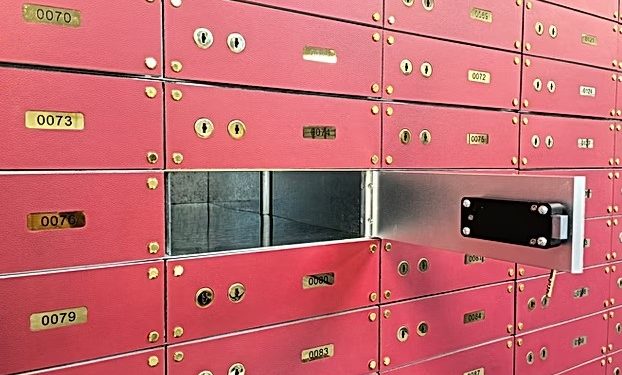Introduction
Safe deposit boxes (sometimes called safe deposit lockers) are secure, specialized storage units—usually located in banks or private vaults—designed to protect items of high value or importance. If you’re thinking of acquiring one (whether through purchase, long-term lease, or renting), it’s good to understand how they work, what they protect, and what limitations you should know.
What Is a Safe Deposit Box?
A Safe deposit boxes for sale is a secure metal box stored within a bank vault or high-security facility. They are typically accessed during the institution’s operational hours, and require dual keys (one held by the renter, one by the bank/vault custodian) for opening.
Features & Security Measures
- Dual-key locking: Both keys (owner’s and custodian’s) are required. 5paisa+2safedepositbox.com.my+2
- Physical security: Vault door(s), tamper-proof construction, reinforced walls. securitygro+1
- Environmental protection: Many boxes are in vaults built to resist fire, theft, water damage, sometimes seismic or other disasters. GeeksforGeeks+2safedepositbox.com.my+2
- Surveillance & monitoring: CCTV, alarms, motion detectors, biometric access in some private vaults. safedepositbox.com.my
What You Can Store
Useful for items that are difficult to replace or are very valuable. Some examples:
- Legal documents: titles/deeds, wills, birth/marriage certificates, ownership papers. Investopedia+1
- Jewelry, precious metals, collectible coins or stamps. Bankrate+1
- Family heirlooms or sentimental items. fsb.bank
- Backups of digital valuables: USB drives or hard drives containing critical information. Investopedia
What You Should Not Store
Because of access limitations and insurance issues, some items are not suitable:
- Items you need immediate access to (passport, power of attorney documents, original wills) — since banks are open only some hours. FDIC+1
- Large amounts of cash — cash doesn’t earn interest in a box; also, banks often disclaim liability. FDIC+2Experian+2
- Illegal or hazardous items. Investopedia
Cost & Availability
- Rental or lease fees vary widely depending on size, location, security features, and provider. For example, in U.S. banks safe deposit box rentals can be from approximately USD 25 up to hundreds of dollars per year depending on size. GeeksforGeeks+1
- Some banks or vault companies charge extra for key replacement, transfers, or special size boxes. U.S. News
- Availability is diminishing in some places. Some banks are phasing out the service entirely or limiting new rentals. The Wall Street Journal+1
Pros & Cons
| ✅ Pros | ⚠️ Cons |
|---|---|
| High security vs theft, fire, and natural disasters. GeeksforGeeks+1 | Access restricted to bank-hours; not available 24/7. FDIC+1 |
| Privacy & confidentiality for sensitive items. GeeksforGeeks+1 | Bank doesn’t insure contents; renter must insure separately. FDIC+1 |
| Organization: keep important documents and valuables all in one secure place. fsb.bank | Limited size; some items may not fit. Investopedia+1 |
| Discreet & off-site storage (helpful if moving, home risk etc.). fsb.bank | Risk of losing key; losing access if fees unpaid; contents vulnerable if bank closes or policy changes. FDIC+1 |
What to Look for When Buying / Renting a Safe Deposit Box
When you are shopping or asking for “safe deposit boxes for sale” (or more likely for lease/rental), consider:
- Size & Capacity – Estimate the space you need, and ensure there’s room for a little growth.
- Security Level – Checks for fire rating, flood resistance, dual-key system, biometric access, alarm systems.
- Location / Vault Provider Reputation – Banks vs private vaults; read reviews.
- Access Policies – Hours, permission rules (who else can access with you or after you’re gone), requirements for key/log records.
- Insurance Options – Ask if contents are insured; often they are not by the institution. You may need supplemental insurance.
- Fees & Hidden Costs – Annual rent, key replacement, late fees, full box deposit, etc.
- Legal / Succession Planning – What happens when you die, move, or the provider changes policy. Make sure you name someone who can legally access the box.
Buying vs Renting / Leasing
- In many regions, “safe deposit boxes for sale” means buying a private safe deposit unit, especially through private vault companies. These may involve upfront purchase plus ongoing maintenance or lease.
- Banks more commonly rent/lease rather than sell boxes. So you’ll usually pay an annual rental fee rather than buy outright.
Alternatives & Complementary Options
- Home safes — can offer good security, especially for things you may need quicker access to; but often less secure compared with bank vaults.
- Digital backups of documents/photos stored off-site or in the cloud.
- Secure lockers in vault-only facilities not affiliated with banks.
Conclusion
Safe deposit boxes for sale are a worthwhile investment if you have items of sentimental, legal, or financial importance that you want to protect securely. Like any security solution, they come with trade-offs — access constraints, cost, size, and insurance limitations. But for many people, the peace of mind they bring is well worth it.
If you decide to get one, do your homework: assess your storage needs, verify the vault’s security, understand all fees, know the access policies, and make sure your items are protected (via insurance or inventory documentation.



